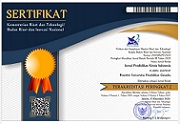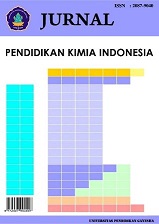Project-Based Learning Implementation in Fundamental Chemistry Courses to Meet the 21st Century Learning Target
DOI:
https://doi.org/10.23887/jpki.v7i2.70368Keywords:
Project-based learning, fundamental chemistry, 21st century learning targetAbstract
This research aimed at describing and explaining the implementation of project-based learning results in Fundamental Chemistry I course. This research was focused in achieving the 21st century learning target, namely students’ critical thinking, creativity, collaboration, and communication skills. This research was conducted in Chemistry Education Study Program of Undiksha involving 19 people of first year students in academic year 2022/2023. This research was qualitative research using descriptive method. The data were collected by utilizing observation and document analysis techniques and analyzed by using interpretive analysis. The research results reveal that: 1) Students are able to propose project titles critically and creatively in accordance with the given theme; 2) Students are able to plan and implement the project as well as report the project results in accordance with the given format; and 3) Students are able to communicate the project orally and written through classroom presentation and project report writing.
References
Eliyarti & C. Rahayu. 2022. Refleksi Aktivitas Mahasiswa dalam Perkuliahan Daring Kimia Dasar Menggunakan Zoom. Edusaintek: Jurnal Pendidikan, Sains dan Teknologi, 9(1),184-201. DOI: https://doi.org/10.47668/edusaintek.v9i1.410
Eliyarti & C. Rahayu. 2019. Deskripsi Efektivitas Kegiatan Praktikum dalam Perkuliahan Kimia Dasar Mahasiswa Teknik. EduSains: Jurnal Pendidikan Sains & Matematika, 7(2), 51-60. DOI: https://doi.org/10.23971/eds.v7i2.1476
Friliyanti, A., I. W. Muderawan, & S. Maryam. (2021). Analisis Kesulitan Belajar Siswa dalam Mempelajari Kimia Kelas XI. Jurnal Pendidikan Kimia Undiksha, 5(1):11-18. DOI: https://doi.org/10.23887/jjpk.v5i1.32402
Juwita, R. 2020. Pengaruh Pembelajaran Daring Terhadap Hasil Belajar Mahasiswa Pada Mata Kuliah Kimia Dasar Ditinjau Dari Kemampuan Awal Mahasiswa. Jurnal Pelangi, 12(1), 46-51.
Hartono, M. 2022. Profil Pelajar Pancasila dalam Kurikulum Merdeka. Binus University, Faculty of Humanities. https://pgsd.binus.ac.id/2022/12/17/profil-pelajar-pancasila-dalam-kurikulum-merdeka/#:~:text=Pelajar%20Pancasila%20adalah%20perwujudan%20pelajar,royong%2C%20mandiri%2C%20bernalar%20kritis%2C
Mardhiya, J., H. Setiowati1, & L. K. Harahap. 2020. Proyek Video Sebagai Asesmen Alternatif dalam Pembelajaran Daring Mata Kuliah Kimia Dasar. Journal of The Indonesian Society of Integrated Chemistry, 12(2), 46-54. DOI: https://doi.org/10.22437/jisic.v12i2.11005
Munandar, H. & O. Rumape. 2021. Peningkatan Hasil Belajar Kimia Dasar Mahasiswa STKIP PI Makassar Melalui Penerapan Model Pembelajaran Kimia Berbasis Concept Mapping Dipadu Teams Games Tournament. Jambura Journal of Educational Chemistry, 3(2), 40-46. DOI: https://doi.org/10.34312/jjec.v3i2.11194
Puspita, K., M. Nazar, L. Hanum, & M. Reza. 2021. Pengembangan E-modul Praktikum Kimia Dasar Menggunakan Aplikasi Canva Design. Jurnal IPA dan Pembelajaran IPA, 5(2), 151-161. DOI: https://doi.org/10.24815/jipi.v5i2.20334
Rahayu, R, S. Inkandar, & Y. Abidin. 2022. Inovasi Pembelajaran Abad 21 dan Penerapannya di Indonesia. Jurnalbasicedu, 6 (2), 2099-2104. DOI: https://doi.org/10.31004/basicedu.v6i2.2082
Silalahi, M. V. 2020. Pengembangan Media Exe-Learning Pada Kimia Dasar Terhadap
Hasil Belajar Mahasiswa Di HKBP Nommensen Pematangsiantar. Jurnal Pedagogi dan Pembelajaran, 3(3), 516-524.
Simangunson, A. D. & E. P. Pane. 2021. Pengembangan Modul Kimia Dasar Berbasis Discovery Learning pada Materi Stoikiometri. Edukatif : Jurnal Ilmu Pendidikan Volume, 3(6), 4415-4425. DOI: https://doi.org/10.31004/edukatif.v3i6.1472
Siregar, A. D. 2020. Pengembangan Perangkat Pembelajaran pada Mata Kuliah Kimia Dasar DOI: https://doi.org/10.21580/jec.2020.2.1.5512
Berdasarkan Kurikulum KKNI. Journal of Educational Chemistry, 2(1), 1-8
Slavin, R. 2009. Cooperative Learning: Teori, Riset, dan Praktik. Ali Bahasa oleh Nurulita. Bandung: Nusa Media.
Subagia, I W. 2022. Metode Penelitian Kualitatif dalam Pendidikan: Masalah, Teori, dan Praktik. Singaraja: Undiksha Press.
Suci, Y. T. 2018. Menelaah Teori Vygotsky dan Interdepedensisosial sebagai Landasan Teori dalam Pelaksanaan Pembelajaran Kooperatif di Sskolah Dasar. Naturalistic: Jurnal Kajian Penelitan Pendidikan dan Pembelajaran, 3(1), 231-239. DOI: https://doi.org/10.35568/naturalistic.v3i1.269
Tabunsaribu G. & Y. Galingging. 2021. Masalah yang Dihadapi Pebelajar Bahasa Inggris dalam Memahami Pelajaran Bahasa Inggris. Dialetika: Jurnal Bahasa, Sastra dan Budaya, 8(1): 31-41. DOI: https://doi.org/10.33541/dia.v8i1.3110
Wahyudiati, D. & Fitriani. 2021. Etnokimia: Eksplorasi Potensi Kearifan Lokal Sasak sebagai DOI: https://doi.org/10.23887/jpk.v5i2.38537
Sumber Belajar Kimia. Jurnal Pendidikan Kimia Indonesia, 5(2), 102-111.
Zulfahmi & F. Handayani. 2020. Analisis Kesulitan Belajar Mahasiswa dalam Perkuliahan
dan Praktikum Kimia Dasar Jurusan Farmasi Universitas Ubudiah Indonesia. Journal of Education Science (JES), 6(1), 86-95.
Downloads
Published
How to Cite
Issue
Section
License
Copyright (c) 2024 I Wayan Subagia, A.A.I.A. Rai Sudiatmika

This work is licensed under a Creative Commons Attribution-ShareAlike 4.0 International License.
Authors who publish with the Jurnal Pendidikan Kimia Indonesia agree to the following terms:
- Authors retain copyright and grant the journal the right of first publication with the work simultaneously licensed under a Creative Commons Attribution License (CC BY-SA 4.0) that allows others to share the work with an acknowledgment of the work's authorship and initial publication in this journal.
- Authors are able to enter into separate, additional contractual arrangements for the non-exclusive distribution of the journal's published version of the work (e.g., post it to an institutional repository or publish it in a book), with an acknowledgment of its initial publication in this journal.
- Authors are permitted and encouraged to post their work online (e.g., in institutional repositories or on their website) prior to and during the submission process, as it can lead to productive exchanges, as well as earlier and greater citation of published work. (See The Effect of Open Access)





